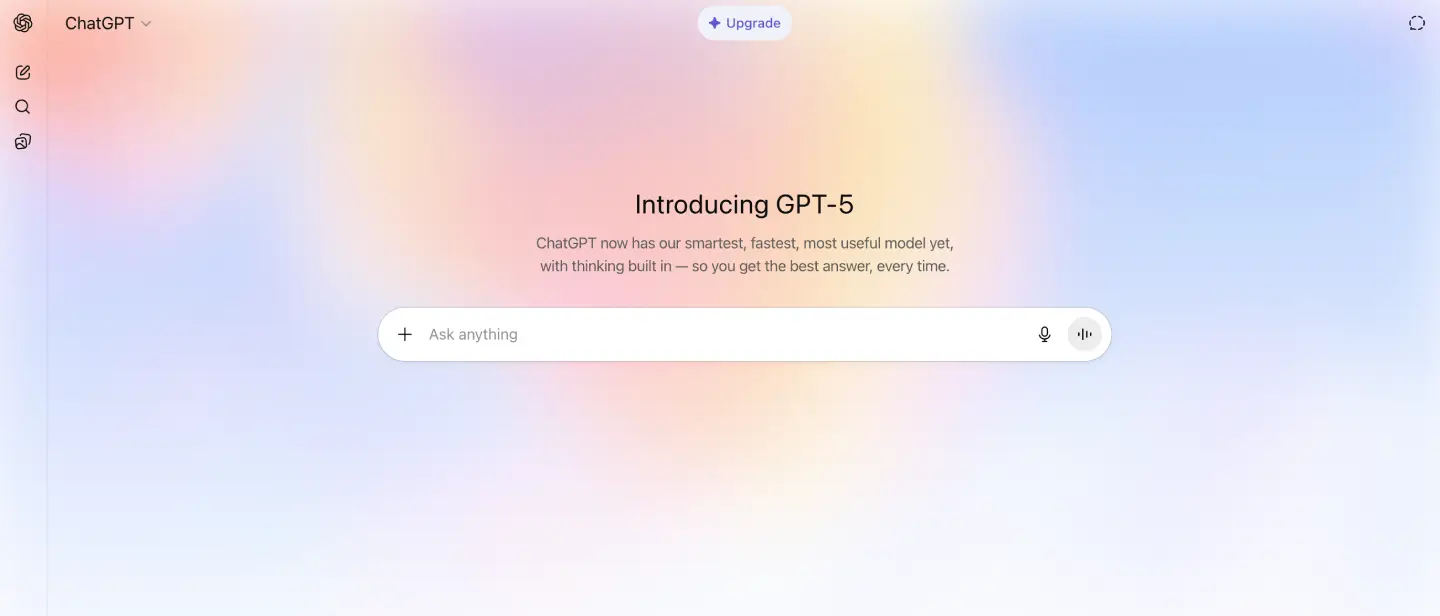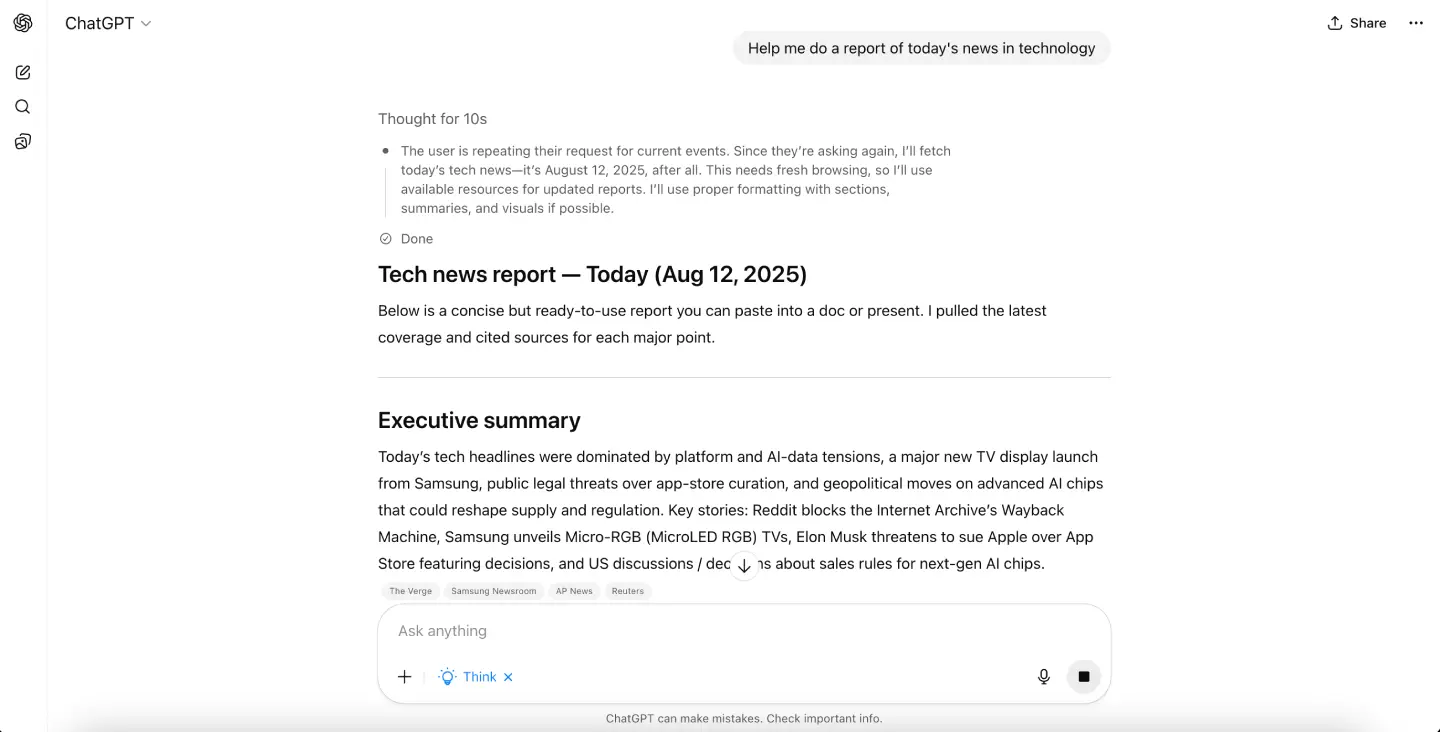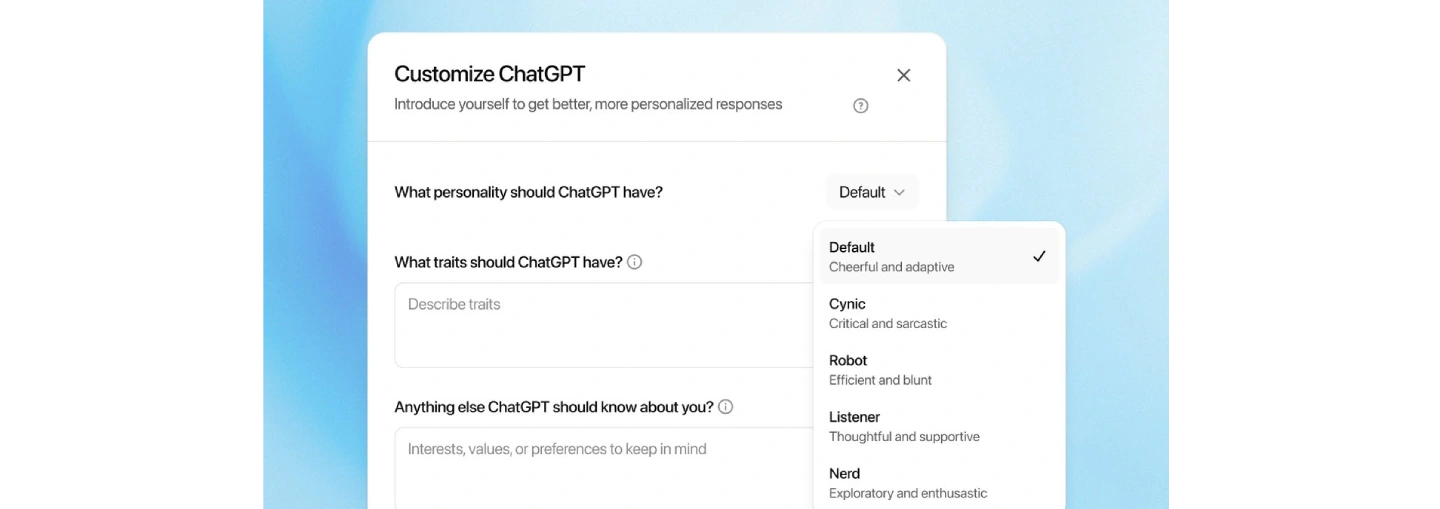OpenAI officially launched ChatGPT 5 on August 7, 2025, introducing what the company describes as its most advanced AI model to date. While OpenAI touts significant improvements in reasoning capabilities, hallucination reduction, and multimodal performance, the public reception has been notably mixed, with many users describing the upgrade as evolutionary rather than revolutionary.
The ChatGPT 5 release brings enhanced features including dynamic routing, new personality modes, and expanded context windows. However, early adopters have voiced both excitement and disappointment, with some criticizing the model's performance and others lamenting the retirement of familiar features from GPT-4o. This launch represents a pivotal moment for OpenAI as the company faces heightened expectations while navigating user feedback and market pressures.
Understanding the reality behind the marketing claims requires examining both the genuine improvements and the legitimate concerns raised by the AI community. Let’s take a look at the 5 highlights of ChatGPT 5.

1. Smart Dynamic Routing: Automated Performance Optimization
The chatgpt 5.0 release date introduced one of the most significant architectural improvements: smart dynamic routing technology. This system automatically determines whether to provide a fast response or engage deeper reasoning capabilities based on query complexity, eliminating the need for users to manually select between different model variants.

Dynamic routing represents a substantial advancement in AI efficiency, allowing the system to optimize performance without user intervention. Simple queries receive immediate responses, while complex problems automatically trigger the model's enhanced reasoning mode. This intelligent switching mechanism aims to balance speed and thoroughness based on contextual requirements.
Key Dynamic Routing Features of ChatGPT 5
- Automatic selection between fast and deep-thinking response modes
- Seamless switching based on query complexity analysis
- Optimized resource allocation for different task types
- Reduced latency for straightforward questions
- Enhanced reasoning deployment for complex problems
However, initial user feedback has reported issues with the dynamic switching mechanism, with some describing it as occasionally slow or bug-prone. These early technical concerns highlight the challenges of implementing sophisticated routing systems while maintaining consistent user experience across diverse query types.
2. Enhanced Context and Multimodal Capabilities
ChatGPT 5 delivers substantial improvements in context handling and multimodal processing, addressing key limitations of previous iterations. The model supports expanded context windows up to 256,000 tokens in ChatGPT and up to 400,000 tokens through the API, enabling more comprehensive analysis of lengthy documents and complex conversations.
Multimodal capabilities have been significantly enhanced, with improved support for text, image, audio, and video inputs. This expansion enables more sophisticated cross-media analysis and generation, opening new possibilities for creative and professional applications. The model demonstrates stronger performance on technical benchmarks including SWE-bench, Aider polyglot, and tool-calling tasks.
Advanced Multimodal Features
- Expanded context windows for comprehensive document analysis
- Enhanced image recognition and generation capabilities
- Improved audio processing and synthesis
- Video content analysis and understanding
- Cross-modal reasoning and integration
- Stronger performance on technical benchmarks
Enterprise users like Box CEO Aaron Levie have praised these improvements, describing GPT-5 as a "complete breakthrough" for handling complex mathematical and logical reasoning within extensive documents where previous models consistently failed.
3. New Personality Modes and Customization Options
ChatGPT pro users and other subscribers now have access to five distinct interaction modes, including the standard Default setting plus four specialized personalities designed to match different user preferences and use cases. This customization feature represents OpenAI's response to user requests for more tailored communication styles while preserving the model's underlying capabilities.
The Default mode maintains the familiar ChatGPT experience with clear, neutral responses that adapt to various contexts. The four additional personalities each offer unique communication approaches optimized for specific scenarios and user preferences.

Specialized Personality Modes
Cynic Mode: Delivers assistance through a sardonic, witty lens that combines humor with practical guidance. This mode provides candid, sometimes irreverent responses while maintaining helpfulness. Users receive direct answers wrapped in dry humor, making it particularly suitable for those who appreciate entertaining yet actionable advice during creative brainstorming or when seeking honest feedback.
Robot Mode: Focuses on maximum efficiency and precision, eliminating conversational flourishes in favor of immediate, direct responses. This mode prioritizes clarity and speed, often structuring complex problems into clear inputs and outputs. It's optimized for technical tasks, troubleshooting scenarios, and situations where users need unambiguous instructions without additional commentary.
Listener Mode: Emphasizes thoughtful reflection and collaborative decision-making through a warm, conversational approach. This mode asks clarifying questions when helpful and focuses on surfacing trade-offs to support user decision-making rather than providing directive answers. It excels in personal planning, decision support, and situations requiring a thoughtful sounding board.
Nerd Mode: Combines enthusiasm for knowledge with accessible explanations, encouraging deeper exploration of topics. This mode provides comprehensive context while suggesting follow-up experiments or learning paths. It's particularly valuable for educational purposes, complex problem-solving, and users who want to understand underlying mechanisms and broader implications.
Personality Customization Features
- Five distinct communication styles for varied interaction preferences
- Maintained core AI capabilities across all personality variants
- Specialized optimization for different use cases and contexts
- User control over conversational tone and approach style
- Enhanced personalization without functionality compromise
4. Reduced Hallucinations and Improved Safety Features
OpenAI officially claims ChatGPT 5 achieves significantly reduced hallucination rates through extensive training improvements and safety evaluations including over 5,000 hours of testing. The model introduces "safe completions" methodology, providing helpful responses to challenging queries while maintaining appropriate safety constraints.
Rather than refusing potentially risky questions outright, the model attempts to provide useful information within established safety parameters. This approach aims to balance helpfulness with responsible AI deployment, though real-world performance improvements are still being evaluated by users and researchers.

Safety and Reliability Improvements Claimed by OpenAI
- Reported reduction in hallucination rates and false information
- Safe completions approach for handling sensitive queries
- Enhanced recognition of task limitations and constraints
- Improved transparency about model capabilities and boundaries
- Extensive safety testing and evaluation protocols
However, industry observers note that while OpenAI's official claims about reduced hallucinations show promise, comprehensive independent verification of these improvements requires more extensive real-world testing and evaluation by the broader research community.
5. API Variants and Developer Resources
OpenAI has released three distinct API variants of ChatGPT 5: gpt-5, gpt-5-mini, and gpt-5-nano, enabling developers to optimize for performance, speed, or cost based on specific application requirements. This tiered approach provides flexibility for organizations with varying computational needs and budget constraints.
The API offerings cater to different use cases, from high-performance applications requiring maximum capability to cost-sensitive implementations prioritizing efficiency. This strategic approach enables broader adoption across diverse industries and application scenarios.
Developer API features include:
- Three model variants optimized for different performance needs
- Flexible pricing structures accommodating various budgets
- Enhanced integration capabilities with existing systems
- Comprehensive documentation and developer support resources
- Scalable solutions for organizations of different sizes
Early enterprise adoption has been positive, with major technology companies like Microsoft rapidly integrating GPT-5 across their product ecosystems, including Microsoft 365 Copilot and Azure AI Foundry.
User Reception: Mixed Reviews and Backlash
Despite OpenAI's marketing claims, the chatgpt 5.0 launch has received notably mixed reviews from users and industry observers. Many early adopters have expressed disappointment, describing the improvements as incremental rather than transformational, contradicting expectations for a major breakthrough.
Significant user complaints have emerged regarding personality changes, perceived creativity loss, and technical issues. Some users describe the new model as feeling more "corporate" and less engaging than GPT-4o, leading to widespread requests for the return of previous model characteristics. This backlash prompted CEO Sam Altman to temporarily restore GPT-4o access for Plus users while promising improvements.
User feedback patterns include:
- Widespread description of improvements as evolutionary, not revolutionary
- Complaints about diminished creativity and personality
- Technical issues with dynamic routing and performance
- Requests for return of GPT-4o characteristics
- Mixed reception despite claimed technical improvements
Industry publications have labeled the launch as "overhyped" and "underwhelming," suggesting that expectations may have been set too high relative to the actual improvements delivered.
Availability and Access Limitations
While OpenAI has made ChatGPT 5 available across user tiers, access comes with significant limitations, particularly for free users. The rollout strategy includes graduated access with usage caps and fallback mechanisms that may impact user experience.
Free users face strict message limits (approximately 10 messages per 5 hours) before being redirected to the GPT-5 mini model, though they receive one daily GPT-5 Thinking message. Plus, Pro, and Team users enjoy higher usage limits, with Pro subscribers receiving unlimited access to both GPT-5 and GPT-5 Pro variants.
Access tier breakdown includes:
- Free users: Limited messages with fallback to mini model
- Plus users: Higher usage limits with enhanced features
- Pro users: Unlimited access to GPT-5 and GPT-5 Pro
- Enterprise and Education users: Gradual rollout in progress
- Team users: Collaborative access with enhanced capabilities
The staged rollout approach reflects OpenAI's need to manage computational resources while accommodating its massive user base of approximately 700 million weekly active users.
FAQs
Q1: What are the main improvements in ChatGPT 5 compared to previous versions?
A1: ChatGPT 5 significantly improves accuracy in understanding and generating text, supports more complex multimodal inputs like images combined with text, enhances reasoning abilities, reduces hallucinations, and offers a smoother, more natural interaction experience.
Q2: Does ChatGPT 5 support real-time internet access for up-to-date information?
A2: Yes, ChatGPT 5 features enhanced internet connectivity allowing it to access current information in real time, making its responses more timely and accurate for scenarios requiring the latest data.
Q3: What multimodal features does ChatGPT 5 support?
A3: Besides text input, ChatGPT 5 can process images, charts, tables, and other data formats, integrating these inputs to provide more precise and context-aware answers suitable for a wider range of applications.
Q4: What privacy and data security improvements does ChatGPT 5 include?
A4: OpenAI has strengthened encryption and user privacy protections in ChatGPT 5, increasing transparency on data usage and ensuring that user information remains secure.
Q5: Which industries and use cases is ChatGPT 5 best suited for?
A5: ChatGPT 5 is ideal for education, healthcare, customer support, content creation, coding assistance, and many other fields, especially excelling at handling complex language understanding and multimodal tasks.
Conclusion: Evolution Over Revolution
ChatGPT 5 represents a notable step forward in AI development, delivering genuine improvements in reasoning capabilities, context handling, and multimodal performance. However, the launch has highlighted the gap between marketing expectations and user reality, with many describing the advancement as evolutionary rather than revolutionary.
The mixed reception underscores the challenges facing AI companies as they navigate increasingly sophisticated user expectations while managing technical limitations and resource constraints. While enterprise customers and developers have praised specific improvements, broader user sentiment suggests that dramatic breakthroughs remain elusive.
OpenAI's response to user feedback, including the temporary restoration of GPT-4o and promises of continued improvements, demonstrates the company's awareness of these concerns. The long-term success of ChatGPT 5 will likely depend on OpenAI's ability to address user criticisms while building upon the genuine technical advances achieved.
As the AI industry continues its rapid evolution, ChatGPT 5 serves as a reminder that progress often comes in incremental steps rather than revolutionary leaps, requiring realistic expectations alongside continued innovation efforts.
References: This article is based on OpenAI's official announcements and mainstream media reports, with emphasis on citing OpenAI's official documents, developer instructions, and independent media reviews/reports to balance official statements with third-party observations.
- OpenAI. “Introducing GPT-5.” OpenAI, 7 Aug. 2025, https://openai.com/index/introducing-gpt-5
- “Customizing Your ChatGPT Personality.” OpenAI Help Center, 2025, https://help.openai.com/en/articles/11899719-customizing-your-chatgpt-personality
- Caswell, Amanda. "ChatGPT-5 Features — Here's the 5 Upgrades I Would Try First." Tom’s Guide, 8 Aug. 2025, https://www.tomsguide.com/ai/chatgpt-5-features-heres-the-5-upgrades-i-would-try-first
 Submit Your AI Tool For FREE!Showcase Your Innovation To Thousands Of AI Enthusiasts!
Submit Your AI Tool For FREE!Showcase Your Innovation To Thousands Of AI Enthusiasts! Submit Your AI Tool For FREE!Showcase Your Innovation To Thousands Of AI Enthusiasts!
Submit Your AI Tool For FREE!Showcase Your Innovation To Thousands Of AI Enthusiasts! Submit Your AI Tool For FREE!Showcase Your Innovation To Thousands Of AI Enthusiasts!
Submit Your AI Tool For FREE!Showcase Your Innovation To Thousands Of AI Enthusiasts! Submit Your AI Tool For FREE!Showcase Your Innovation To Thousands Of AI Enthusiasts!
Submit Your AI Tool For FREE!Showcase Your Innovation To Thousands Of AI Enthusiasts! Submit Your AI Tool For FREE!Showcase Your Innovation To Thousands Of AI Enthusiasts!
Submit Your AI Tool For FREE!Showcase Your Innovation To Thousands Of AI Enthusiasts!







No comments yet. Be the first to comment!